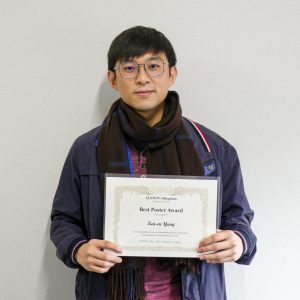2023年03月13日
【受賞/表彰等】原子力国際専攻酒井研究室 楊凱恩さん (D1) が 「Q-STEP Colloquium」 において 「Best Poster Award」 賞を受賞されました。
2023年2月28日、原子力国際専攻酒井研究室 楊凱恩さん (D1) が 「Q-STEP Colloquium」 において 「Best Poster Award」 賞を受賞されました。
<受賞した賞の名称と簡単な説明>
「Best Poster Award」賞
「Q-STEP Colloquium」 において、優れたポスターに対して贈られる賞です。
<受賞された研究・活動について>
発表/ポスターのタイトル: Data-driven POD-based Reduced Order Model (ROM) for Research on Complex Granular System: Focusing on Bead Milling Process
講演概要:
Bead milling is a widely applied process for the dispersion and/or grinding of fine particles in the chemical industry. Previously, the research on it suffered the computational cost caused by the huge total amount of particles and the inapplicability of the coarse-grain model hinders the development of related research. We introduce a novel data-driven approach aiming at a faster, robust, and industrially applicable solution for bead milling simulation, named LPOD-based ROM (Lanczos Proper Orthogonal Decomposition based Reduced Order Model). Empowered by LPOD, the main flow structure and corresponding coefficients (weight and dominance of each mode) are extracted efficiently. Further, the temporal relationships among all coefficients are revealed, and learned by a neural network (e.g., RBF (Radial Basic Functions), LSTM (Long-Short term memory)). Consequently, the trained neural network can reconstruct the reduced-order solutions over time. It is also found the time-step is a crucial factor for the performance of LPOD-based ROM. This approach demonstrates a drastically faster manner compared to the conventional DEM-CFD with adequate accuracy and flexibility. The LPOD-based ROM can promisingly serve as a fast, flexible, and robust surrogate model for further research of the bead milling process and other complex granular systems.
<今後の抱負・感想>
It is my pleasure to be awarded one of the best posters in the Q-STEP colloquium, where numerous quantum science research was presented. My highest appreciation belongs to all the Sakai Lab members, especially Prof. Sakai, Dr. Shuo Li, and Dr. Guangtao Duan. Laser-focusing on the bead milling process, I will commit myself to the research aiming at improving the proposed method to benefit the studies on granular systems in the future.



